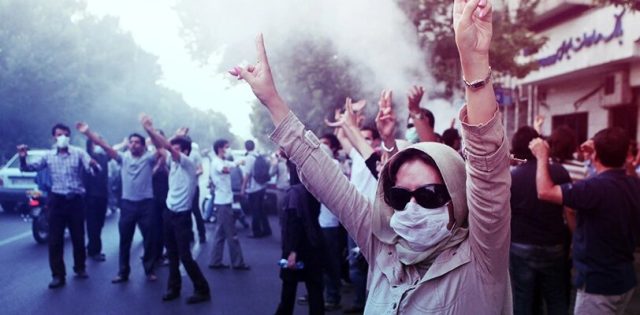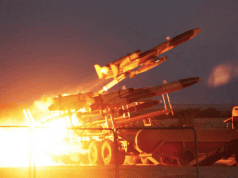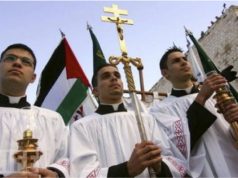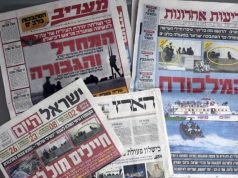By Rachel Avraham
In recent days, the ground in Iran has been shaking with demonstrations all over the country. On September 16, Mehsa Amini was arrested by the Morality Police for the crime of not wearing her hijab properly. Two days after her arrest, she was pronounced dead at the hospital in Tehran. The death of the young woman caused Iranian women to protest all over the country and later caused the rest of the Iranian population protest as well.
Since Mahsa Amini belongs to the Kurdish community in Iran, the Kurds went out to protest against the murder of a young woman from their sector and were among the first to protest alongside the Iranian women. But the Kurds are not the only ethic group in Iran to protest against her fate. Aside from Persians, the Baluchis, Lurs, Turkmen, Azeris, Arabs, and other minorities populate Iran. The Persians in Iran make up only less than 50% of the country’s population and they rule with a heavy hand over all other minorities.
Just like modern Turkey, which before its establishment by Atatürk was the Ottoman Empire, Iran also originates from the Persian Empire of the Safavid dynasty. This Persian dynasty converted the religion in Iran to Shiite Islam from Sunni Islam around 1750. After the Safavid dynasty, the Qajar dynasty ruled the empire and the one who took its place was the Pahlavi dynasty in 1925. The Pahlavi dynasty ruled Iran until the Islamic revolution in 1979.
When the Revolutionary Guards took power in Iran, they purported to be the representatives of all the oppressed peoples on earth, but was their behavior and management different from the government they claimed to replace? Does he who calls himself the representative of all the oppressed peoples behave decently and fairly towards the occupied peoples he rules over?
We will take the case of the Ahwaz in Iran as a case study. Ahwaz, or by its Persian name today Khuzestan, is a province in Iran inhabited by various Sunni Muslim Arab tribes and its capital is Al-Muhammarah. About 12 million people live in Ahwaz and the district is located in southwest Iran, near the Iraqi border and the exit to the Persian Gulf, about 120 kilometers northeast of the Iraqi city of Basra. Originally, Ahwaz was ruled by a small Arab principality called Arabiastan, until in 1920 the British decided to annex the principality to Iran. The emir of the principalities was kidnapped by the Iranians and the Ahwaz region has since been under Iranian rule.
As far as Iran is concerned, the annexation of Ahwaz was like winning the lottery – the province has fertile soil thanks to the Karun River that runs through it. Therefore, Ahwaz is the main producer of crops such as corn and sugar in Iran. In addition to this, Ahwaz is rich in gas and oil, so the natural resources found there makeup about half of Iran’s net national product and over 80% of Iran’s export value. Iran relies so much on the product produced in the territory of Ahvaz, that the former president of Iran, Mohammad Khatami, claimed that Iran lives in Khuzestan (a statement that became famous). The irony is that Ahwaz, which is considered one of the richest regions in the country in terms of natural resources, is inhabited by some of the poorest people on the planet.
After Iran annexed Ahwaz, the Persian government began to thin out the Arab population in Ahwaz and increase the percentage of Persians in the province. Iran began a campaign to erase the Arab Ahwazi culture from Khuzestan: the names of the streets were changed to Persian names from their original Arab names, the Arabic language was forbidden to be used on the street, parents were forbidden to name their children Arab names, and Arab clothing was forbidden to wear by law. When the Iranian moves did not produce the required results, it was decided to apply more force.
Hamid Mutashir, the head of the Ahwaz Liberal Party, proclaimed in a recent interview: “Until today, the Iranian occupiers seek to increase the proportion of non-Arab Persian settlers, whose numbers exceed 8 million settlers in Al Ahwaz. The regime in Tehran has satanic tricks to fight against the Arabic language and identity. Among them was the rejection of all transactions if they were not in the Persian language. Referrals to government departments were barred if they were not in the Persian language. The testimony of any Arab in the courts is not accepted if they do not speak Persian and they do not accept the presence of any interpreter. Ahwazi Arabs are barred from government jobs unless they speak Persian. Many Ahwazi Arabs who refuse to speak Persian have been displaced outside their territory.”
According to Mutashir, when in 1928, the residents of Ahwaz tried to rebel and break away from the Shah’s rule, they were suppressed with great force, which caused many deaths among the Arab population in Ahwaz. To this day, the Iranian authorities oppress, mistreat and expel many Arabs to the north of Iran and displace them from their homes to prevent the Ahwazis from uniting against Iran.
Although the government in Iran today is not the same government as it was in the 1920s, the Revolutionary Guards continue the methods of oppression that receive “religious” backing. The people of Ahwaz are still oppressed and live in dire poverty. These days when the rule of the Revolutionary Guards is unsettled, western thinking towards Iran should begin to change from a country whose government needs to be replaced, to an empire that needs to be broken up and to free the peoples occupied under it. Just as the Arabs in Ahwaz are oppressed under Persian rule for a hundred years, so is the rest of the ethnic groups.
After Iran breaks up and is re-established as a variety of independent countries, these countries will in turn become partners for the State of Israel and the West in general. In August 2021, one of the Ahwaz leaders, Hamid Mutashir, published a message to then-Prime Minister Naftali Bennett: “We, the Ahwaz people, greatly appreciate the State of Israel. You are a powerful, respected country – and the only ones who can influence the fate of the region.”
The West should embrace the Ahwazi people and help them against the Revolutionary Guards, who oppress the entire population of Iran and threaten to destroy the only Western country in the Middle East. As Mutashir noted, “Al Ahwaz is a country capable of being a cornerstone of the Abraham Accords. Therefore, I renew my call to the world to please support us.”
 Rachel Avraham is a political analyst working for the Safadi Center for International Diplomacy, Research, Public Relations and Human Rights, which is run by Mendi Safadi, a former Likud Candidate for the Knesset and a former chief of staff of former Israeli Communication Minister Ayoob Kara. Since 2012, she has been working as an Israel-based journalist and writer, covering Iran, Kurdistan, Turkey, Iraq, Syria, the Israeli-Palestinian conflict, and other developments in the greater Islamic world.
Rachel Avraham is a political analyst working for the Safadi Center for International Diplomacy, Research, Public Relations and Human Rights, which is run by Mendi Safadi, a former Likud Candidate for the Knesset and a former chief of staff of former Israeli Communication Minister Ayoob Kara. Since 2012, she has been working as an Israel-based journalist and writer, covering Iran, Kurdistan, Turkey, Iraq, Syria, the Israeli-Palestinian conflict, and other developments in the greater Islamic world.
Her articles have appeared in the Washington Times, the Hill, Front Page Magazine, the Daily Wire, the Christian Post, the Baltimore Jewish Times, the Jerusalem Post, Israel Hayom, Ahval and many other publications across the globe. She received her MA in Middle Eastern Studies from Ben-Gurion University. She got her BA in Government and Politics with minors in Jewish Studies and Middle Eastern Studies from the University of Maryland at College Park.





